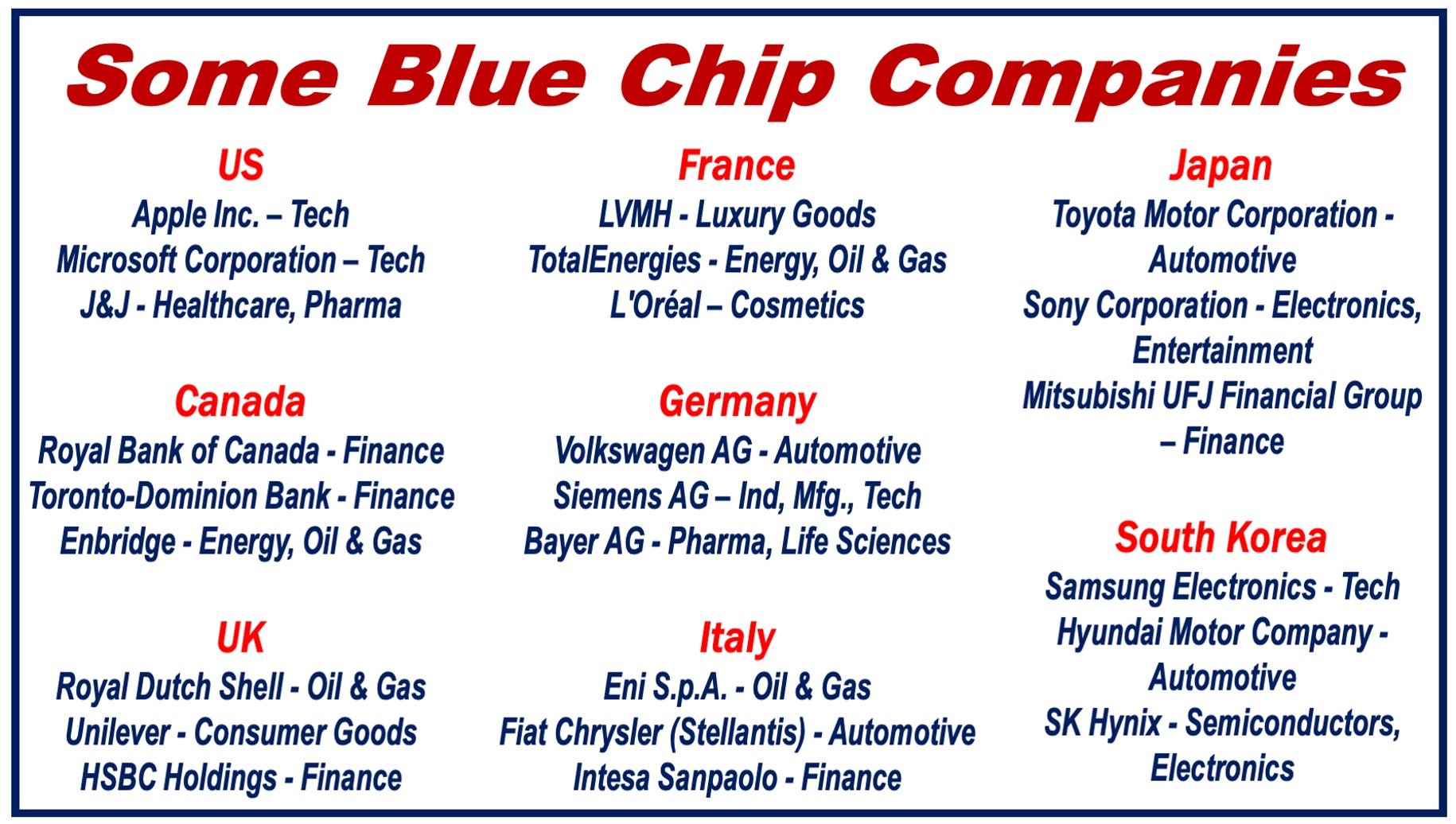Blue Chip Stocks are the shares of blue-chip companies – well-established and financially stable firms that have been in business for many years, demonstrating resilience in reputable market indexes. They have stood the test of time – they have survived through business cycles, i.e. periods of economic expansion followed by contraction (boom and bust).
A market index consists of numbers that represent weighted values of, for example, different shares. The Dow Jones Industrial Average is a market index.
Less risky investments
Investors typically opt for blue chip stocks as they are much less risky than start-ups or companies that haven’t yet proved themselves in the market.
While blue chip stocks are known for their stability, their performance is also closely linked to the overall health of the economy and can be influenced by both domestic and global economic trends.
Additionally, many blue chip companies are multinational corporations, meaning their stock performance can offer insights into global market trends and international business conditions.
Blue chip companies are more likely to be able to ride market dips (bear markets) than most other companies. Put simply, they are the most trusted stocks. If you want to invest in the stock market, you would be wise to start off by placing your bets on blue-chip stocks, experts say.

However, they are only relatively safer than other stocks, and like any giant animal on top of the food chain, events can damage them, or even wipe them out, as occurred with dinosaurs.
Blue chip stocks sometimes in danger
During the Great Recession that followed the financial crisis in 2008, a number of leading banks and giant multinationals, including General Motors (all considered to be blue chip companies) went bankrupt. Had many of them not been bailed out by the taxpayer, they perhaps might not be here today.
Remember that while blue chips are more likely to survive market fluctuations, they are certainly not completely immune to them.
According to ft.com/lexicon.com, a blue chip stock is defined as:
“Stock in a well-managed company with a large amount of paid-up capital and a long record of paying profits to shareholders during good and bad economic conditions.”
Where does the term blue chip come from?
The term was coined by Wall Street Journal editor Oliver Gingold in the 1920’s. Gingold was standing by the stock ticker at a brokerage firm (which later became Merrill Lynch) and spotted several pricey trades, worth at least $200 per share. He then said he intended to “write about these blue-chip stocks” as soon as he got back to the office.
Mr. Gingold was thinking about the chips used in the betting card game poker. Basic poker disks come in three colors, white, red and blue, worth $1, $5 and $25 dollars respectively. Everybody likes the blue chip because it is the most valuable.

Dow Jones Industrial Average
The Dow Jones Industrial Average is the most popular index that follows the performance of thirty blue chip stocks – from corporations that are leaders in their industry. Another popular index that follows US blue chip companies is the Standard and Poor’s 500 Index (S&P 500).
The Dow Jones Industrial Average is comprised of the following blue chip companies: AT&T, Verizon Communications, Chevron, General Electric, Intel, Cisco Systems, McDonalds, Pfizer, Coca-Cola, Procter & Gamble, Merck, Microsoft, Johnson & Johnson, Exxon Mobil, Dupont, JPMorgan Chase, Travelers, 3M, Wal Mart, Home Depot, Caterpillar, Boeing, IBM, United Technologies, UnitedHealth Group, NIKE, Goldman Sachs, Disney, American Express, and Visa.
In the UK, the FTSE 100 Index (Financial Times Stock Exchange Index) is a share index of the 100 most highly capitalized companies in the country that are listed on the London Stock Exchange. They are sometimes referred to as the ‘Blue-Chip List’.
Major Market Index
The NYSE Arca Major Market Index focuses on top blue-chip companies. It comprises 20 blue-chip stocks, of which 17 also appear in the DJIA (Dow Jones Industrial Average).
Compound phrases
From the term ‘blue chip’ we can make three-word compound phrases. In business English, there are many of them. Here are five of the most popular one:
- Blue Chip Index: A stock market index tracking stable, established companies, such as the such as the Dow Jones Industrial Average (DJIA).
- Blue Chip Fund: A mutual fund investing mainly in blue chip stocks.
- Blue Chip Company: A large, stable, and long-established industry leader, such as Apple Inc. (American), Royal Dutch Shell (British), and Toyota Motor Corporation (Japanese).
- Blue Chip Investment: A safe, low-risk investment in blue chip stocks.
- Blue Chip Dividend: Reliable dividends paid by blue chip companies.
Other languages
The notion of ‘blue chip’ exists all over the world, including non-English speaking nations. Here is a translation of the term in some widely spoken languages.
Acciones de primera línea (Spanish), ações de primeira linha (Portuguese), Blue-Chip-Aktien (German), Valeurs de première ligne (French), Blue Chip (Italian), Blue Chip (Polish), Синие фишки (Russian), أسهم ذات جودة عالية (Arabic), سهام آبیچیپ (Farsi), ब्लू चिप (Hindi), بلیو چپ (Urdu), ব্লু চিপ (Bengali), 藍籌股 (Cantonese Chinese), 蓝筹股 (Mandarin Chinese), ブルーチップ (Japanese), 블루칩 (Korean), Saham Unggulan (Indonesian), Cổ phiếu blue chip (Vietnamese), Mavi Çip (Turkish).
In Italy and Poland, they use the English term ‘blue chip,’ there isn’t a widely recognized direct translation. In many countries, even though there is a translation, they tend to use the English term when reporting in writing and orally.
2 Videos
These two video presentations, from our sister channel on YouTube – Marketing Business Network – explain what ‘Blue Chip Company’ and ‘Blue Chip Stocks’ mean, using simple and easy-to-understand language and examples.
-
What are Blue Chip Stocks?
-
What is a Blue Chip Company?
